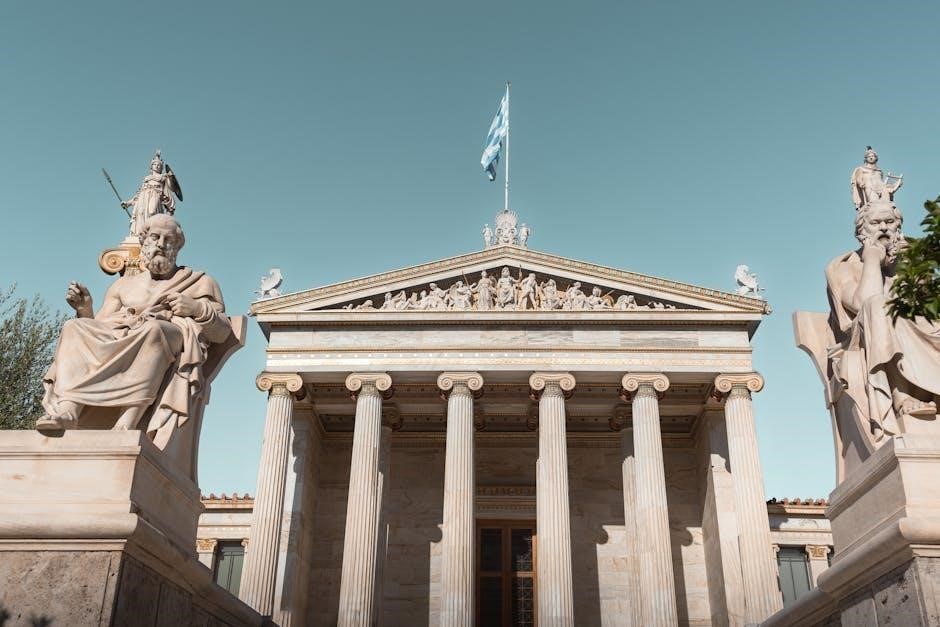Plato’s Meno is a Socratic dialogue exploring the nature of virtue and knowledge. It features Socrates, Meno, and a slave boy, examining whether virtue can be taught or recollected. The text is a cornerstone of Platonic philosophy, blending ethical inquiry with epistemological debates, offering profound insights into learning and morality.
Overview of the Dialogue
Plato’s Meno is a rich Socratic dialogue that delves into the nature of virtue and the process of learning. The conversation primarily involves Socrates, Meno, and a young slave boy, exploring whether virtue can be taught or if it is innate. Socrates employs his method of questioning to guide Meno through a series of logical steps, challenging his understanding of virtue; The dialogue also introduces the concept of recollection, where Socrates demonstrates that knowledge is not acquired but rather remembered from past lives. This is vividly illustrated through the slave boy experiment, where the boy uncovers geometric truths without prior instruction. The dialogue raises fundamental questions about the relationship between knowledge, education, and ethics, making it a pivotal work in Platonic philosophy.
Historical Context and Significance
Plato’s Meno, written around 380 BCE, is a foundational Socratic dialogue that bridges the gap between Plato’s early and middle periods. It reflects the intellectual debates of ancient Athens, particularly the tension between Sophistic education and Socratic philosophy; The dialogue is significant for its exploration of virtue and knowledge, addressing questions that were central to Greek philosophy. By examining the relationship between teacher and student, Plato critiques contemporary educational practices while advocating for a deeper, more reflective approach to learning. The Meno also introduces the theory of recollection, which became a cornerstone of Platonic epistemology. Its enduring relevance lies in its exploration of ethical and epistemological questions, making it a vital text in the study of Western philosophy.

Key Themes in the “Meno” Dialogue
The dialogue explores Socrates’ method of questioning, the paradox of inquiry, the theory of recollection, and the nature of virtue, highlighting the philosopher-king ideal.
The Theory of Recollection
The theory of recollection posits that learning is not acquisition but remembrance of eternal truths. Socrates demonstrates this with the slave boy, who solves a geometry problem without prior knowledge, showing innate understanding. This supports the idea that the soul exists before birth and retains knowledge, making education a process of recollection rather than teaching. The theory underscores Plato’s belief in the immortality of the soul and the interconnectedness of all knowledge, emphasizing the teacher’s role as a facilitator of memory rather than an imparter of new information.
The Question of Whether Virtue Can Be Taught
The dialogue centralizes the debate on whether virtue is teachable, with Socrates challenging Meno’s assertion that it is. Meno argues that virtuous individuals can instruct others, while Socrates questions the existence of such teachers. The exploration delves into the nature of virtue, suggesting it may be unteachable if it lacks a clear definition. Socrates proposes that virtue could be a form of knowledge, implying it might be teachable, but his method of questioning reveals inconsistencies in Meno’s understanding. This inquiry highlights the complexity of defining and transmitting virtue, reflecting Plato’s broader philosophical concerns about education and ethical development.

Major Sections of the Dialogue
The dialogue is divided into key sections: the problem of defining virtue, the slave boy experiment demonstrating recollection, and Meno’s paradox of inquiry. These sections systematically explore the nature of virtue, knowledge, and learning, with Socrates guiding the conversation to uncover deeper truths.
The Problem of Virtue: Can It Be Defined?
The dialogue begins with Meno’s question about whether virtue can be taught. Socrates challenges him to define virtue first, sparking a debate on its nature. Meno offers various definitions, such as virtue being the ability to govern effectively or to acquire wealth. Socrates critiques these, arguing that virtue must be universal and unchanging. The discussion highlights the complexity of defining virtue, emphasizing the need for a consistent and objective understanding. This section sets the stage for exploring whether virtue can be taught, as understanding its essence is crucial to determining its teachability.
The Slave Boy Experiment: Demonstrating Recollection
Socrates conducts an experiment with Meno’s slave boy to illustrate his theory of recollection. Through questioning, the boy, who has no prior geometric knowledge, arrives at the correct solution to a geometry problem. This demonstrates that knowledge is innate and that learning is a process of recollecting what the soul already knows. The experiment challenges Meno’s belief that knowledge must be acquired through teaching, suggesting instead that it emerges from within. This section is pivotal, as it supports Socrates’ argument that true understanding is not taught but uncovered through guided inquiry.
Conversation with Meno: The Paradox of Inquiry
Meno’s conversation with Socrates revolves around the paradox of inquiry: how can one seek knowledge they do not already possess? Socrates challenges Meno to define virtue, but Meno struggles, leading to frustration. This exchange highlights the paradox: if one knows what they seek, inquiry is unnecessary; if they do not, they cannot recognize it when found. Socrates resolves this by introducing the theory of recollection, suggesting knowledge is innate. The dialogue underscores the complexity of learning and the nature of knowledge, showcasing Socrates’ method of questioning to guide Meno toward understanding, despite initial confusion and skepticism.

Philosophical Analysis
The dialogue probes Socratic methodology, recollection theory, and virtue’s teachability, with the slave boy exemplifying innate knowledge and the philosopher-king ideal emerging as a governance model.
Socrates’ Method of Questioning
Socrates employs his signature maieutic method, a dialectical approach aimed at drawing out knowledge through questioning. In the Meno, he guides the slave boy to discover geometric truths, illustrating that learning is recollection. This method challenges assumptions, fostering critical thinking and self-examination. By posing probing questions, Socrates exposes Meno’s misconceptions about virtue, revealing the complexity of defining and acquiring it. His technique emphasizes the importance of active engagement and dialogue in the pursuit of understanding, showcasing philosophy as a collaborative inquiry rather than a didactic process. This method remains central to Platonic philosophy, underlining the power of questioning in uncovering truth.
The Role of the Slave Boy in the Dialogue
The slave boy in Plato’s Meno serves as a pivotal figure to demonstrate Socrates’ theory of recollection. Despite his lack of formal education, the boy is guided by Socrates to derive geometric truths, showcasing that knowledge is innate. This experiment not only highlights the potential for learning but also underscores the belief that the soul possesses eternal knowledge. The slave boy’s role is crucial as he represents the untapped human mind, capable of accessing wisdom through proper questioning. His presence challenges the notion that knowledge must be taught, instead illustrating that it can be awakened. This narrative device reinforces the dialogue’s central themes of recollection and the nature of understanding. The slave boy’s journey from ignorance to insight is a testament to Socrates’ pedagogical method and philosophical ideals.
The Concept of the Philosopher-King
The Philosopher-King is a central idea in Platonic philosophy, representing the ideal ruler who governs with wisdom and justice. In the Meno, this concept emerges as Socrates explores the relationship between virtue, knowledge, and leadership. The Philosopher-King is uniquely qualified to rule, as they possess both the intellectual capacity to understand the eternal Forms and the moral integrity to act for the common good. This figure embodies the unity of wisdom and power, contrasting with the Sophists, who prioritize rhetoric over truth. The Philosopher-King’s role is to guide society toward harmony and virtue, illustrating Plato’s vision of a just and enlightened political order. This idea remains influential, reflecting the enduring relevance of Platonic thought in political and ethical philosophy.

Additional Resources and References
Access Plato’s Meno dialogue in PDF format on academic platforms like Google Scholar or JSTOR. Explore commentaries by renowned scholars for deeper insights into its philosophical themes.
Where to Find the “Meno” PDF Online
Plato’s Meno is widely available online in PDF format. Platforms like Google Scholar, JSTOR, and university repositories offer free access to this seminal text. Additionally, websites such as Project Gutenberg and Perseus Digital Library provide downloadable versions. For a more annotated experience, consider purchasing from academic publishers or accessing through institutional libraries. Ensure to verify the translation and edition for accuracy. These resources make Plato’s dialogue accessible to scholars and enthusiasts alike, fostering deeper engagement with its philosophical themes.
Recommended Commentaries and Interpretations
For deeper insights into Plato’s Meno, explore commentaries by renowned scholars. Paul Ryan offers a meticulous analysis of Socrates’ method and the theory of recollection. Jacob Klein’s work provides a philosophical exploration of the dialogue’s mathematical and ethical dimensions. Martha Nussbaum examines the interplay between virtue and knowledge, while Gail Fine delves into the epistemological implications. These interpretations enrich understanding of the text’s complexities. Additionally, modern philosophers like Alasdair MacIntyre and Charles Kahn provide contemporary perspectives on the dialogue’s relevance. Their works are essential for scholars and readers seeking to unpack the nuances of Plato’s thought and its enduring influence.
Plato’s Meno profoundly explores the nature of virtue and knowledge, showcasing Socrates’ method. Its timeless insights remain central to philosophical debates, inspiring modern thinkers.
Plato’s Meno delves into the nature of virtue and knowledge, questioning whether virtue can be taught or is innate. Socrates employs his method of questioning, guiding Meno and a slave boy to uncover truths through recollection. The dialogue highlights the importance of inquiry and education, challenging the notion that knowledge is merely acquired through teaching. The slave boy experiment demonstrates that knowledge can be awakened, supporting Socrates’ belief in recollection. The paradox of inquiry is central, emphasizing the interplay between ignorance and the pursuit of understanding. Ultimately, the dialogue underscores the significance of philosophical reflection in seeking wisdom and ethical guidance.
Relevance of the “Meno” in Modern Philosophy
Plato’s Meno remains highly relevant in modern philosophy, particularly in debates about education, epistemology, and ethics. Its exploration of whether virtue can be taught resonates with contemporary discussions on moral education and the role of teachers. The theory of recollection challenges modern views on learning, suggesting innate knowledge exists within individuals. The dialogue’s emphasis on critical inquiry aligns with modern philosophical methods, encouraging skepticism and self-reflection. Its themes of knowledge as recollection also intersect with discussions on innate ideas and the nature of human understanding. Additionally, the dialogue’s focus on ethical inquiry continues to influence moral philosophy, making it a timeless work in the study of philosophy and education.
